
- 1- Introduction
- 2- Understanding Dojang Etiquette
- 3- Respecting Rules and Customs When Visiting Another Dojang
- 4- Real-Life Case: A Respectful Visit to a New Dojang
1- Introduction
As a practitioner of Tae Kwon Do, visiting another dojang (training hall) can be a rewarding experience. It offers an opportunity to learn from different instructors, experience new training environments, and interact with fellow martial artists. However, it’s important to approach this experience with respect for the dojang’s traditions, rules, and students. Each dojang may have its own set of customs and expectations, and understanding these can make your visit smooth and respectful. In this article, we will explore the etiquette of visiting another Tae Kwon Do dojang and how to ensure your visit is positive for both you and the host dojang.

CKO Kickboxing Sheepshead Bay / cko kickboxing sheepshead bay brooklyn ny
2615 E 17th St, Brooklyn, NY 11235, USA
2- Understanding Dojang Etiquette
In Tae Kwon Do, etiquette goes beyond physical practice—it’s about fostering respect, discipline, and community. Etiquette in a dojang helps to create an atmosphere where everyone can learn and grow in a safe and respectful environment. When visiting another dojang, adhering to its etiquette is essential to maintaining harmony and showing respect for the instructor and fellow students.

Plus One Defense Systems / plus one defense
West HartfordCapitol Planning RegionConnecticut
9 Tolles St, West Hartford, CT 06110, USA
1. Bowing and Showing Respect
Bowing is a fundamental part of Tae Kwon Do, both when entering and leaving the dojang. When visiting another dojang, make sure to bow properly when entering the training area, as this gesture signifies respect for the space, the instructor, and your fellow practitioners. Additionally, always bow before and after practicing with a partner. This shows humility and respect for the art and the person you are training with.
2. Addressing the Instructor and Students
When addressing the instructor, always use their proper title and show respect, even if they are not from your home dojang. In many dojangs, instructors are referred to as "Sabum Nim" (master). Similarly, refer to fellow students by their rank, as this demonstrates respect for their level of expertise. Avoid addressing anyone by their first name unless instructed to do so, as this is considered impolite in most martial arts settings.
3. Following the Dojang’s Rules
Each dojang may have different rules regarding dress code, warm-up routines, and training methods. Before attending a class in another dojang, take the time to ask about or observe the dojang's specific rules. For example, some dojangs may require students to wear a specific color belt or uniform, while others may not. It is important to respect these traditions, as they are an integral part of the culture of each dojang.
3- Respecting Rules and Customs When Visiting Another Dojang
Aside from the general etiquette of bowing and addressing people respectfully, there are several specific practices to consider when visiting another dojang. Here are some key customs to keep in mind:
1. Arriving on Time
Being punctual is a crucial aspect of Tae Kwon Do etiquette. Arriving late not only disrupts the class but also disrespects the instructor and the other students. If you know you'll be late for any reason, inform the instructor in advance if possible. When you do arrive, enter the dojang quietly and bow before joining the class, even if the session has already started.
2. No Disruptions During Class
During class, stay focused and refrain from talking or distracting others. If you need to ask the instructor a question or make a request, do so politely during appropriate breaks or after class. Respect the instructor's instructions and avoid offering unsolicited advice unless invited to do so. Keep the conversation and noise to a minimum to maintain a disciplined training environment.
3. Training with an Open Mind
While it's important to stay humble and respect the practices of the new dojang, it's equally essential to approach the training with an open mind. Be willing to learn different techniques, styles, and training methods. Every dojang has its own approach to teaching Tae Kwon Do, and adapting to those differences can enhance your understanding of the martial art.
4- Real-Life Case: A Respectful Visit to a New Dojang
Take the example of Alex, a blue belt who decided to visit a new dojang while on vacation. Alex had been training at his home dojang for two years and was eager to experience a different style of teaching. Upon arriving at the new dojang, Alex was greeted by the instructor and other students with warmth and respect. Alex bowed when entering the training hall, addressed the instructor as "Sabum Nim," and followed all the dojang’s rules. During class, Alex remained attentive and respectful, asking the instructor a few questions after class about techniques that were new to him. The experience was incredibly enriching for Alex, as he not only learned new techniques but also gained a deeper appreciation for the culture and etiquette of Tae Kwon Do. His visit was a success because he approached it with respect, humility, and an open mind.

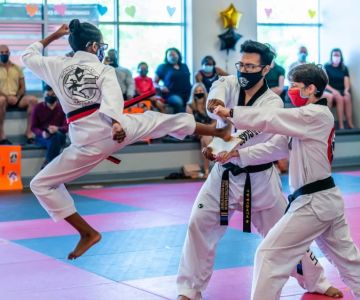
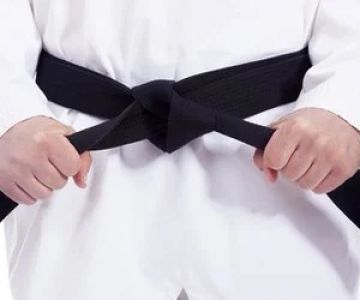
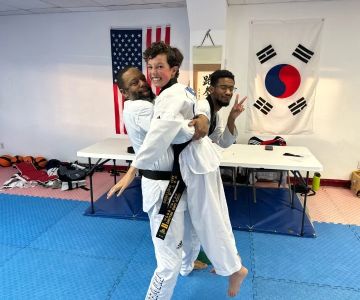
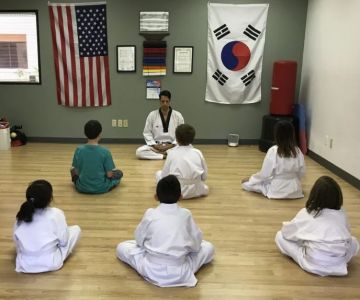
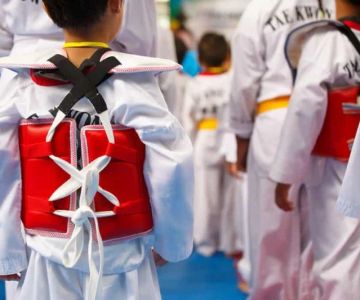
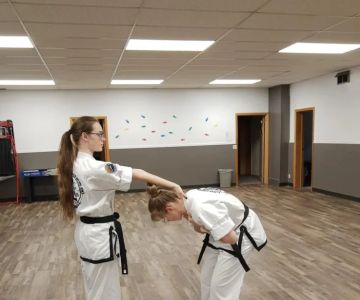
 Fort Walton ATA Martial Arts4.0 (11 reviews)
Fort Walton ATA Martial Arts4.0 (11 reviews)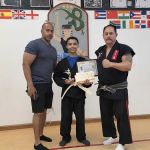 Universal Warrior Mixed Martial Arts4.0 (27 reviews)
Universal Warrior Mixed Martial Arts4.0 (27 reviews) Team Pure Fitness4.0 (27 reviews)
Team Pure Fitness4.0 (27 reviews) Heart & Dagger BJJ5.0 (112 reviews)
Heart & Dagger BJJ5.0 (112 reviews) Twin Tigers Martial Arts5.0 (38 reviews)
Twin Tigers Martial Arts5.0 (38 reviews) Champions Martial Arts Upper East Side5.0 (51 reviews)
Champions Martial Arts Upper East Side5.0 (51 reviews) How to Execute a Jumping Roundhouse Kick to the Head
How to Execute a Jumping Roundhouse Kick to the Head How to Execute a Double Kick Combination in Sparring
How to Execute a Double Kick Combination in Sparring How to Perform a Flawless Axe Kick: A Step-by-Step Guide
How to Perform a Flawless Axe Kick: A Step-by-Step Guide DIY Tae Kwon Do Training Equipment for Home Practice
DIY Tae Kwon Do Training Equipment for Home Practice How to Increase Your Vertical Jump for Tae Kwon Do Flying Kicks
How to Increase Your Vertical Jump for Tae Kwon Do Flying Kicks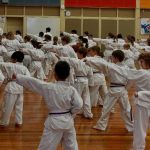 The History of the Tae Kwon Do Peace Corps
The History of the Tae Kwon Do Peace Corps